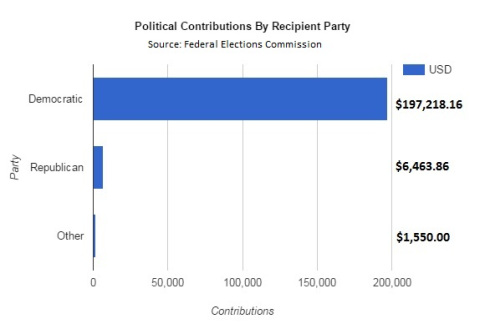Ninety-six percent of campaign contributions by Fordham professors, researchers and teaching fellows over the past five years went to Democratic candidates and political action committees, according to a Ram analysis of Federal Election Committee data.
Between January 2011 and August 2016, the 176 Fordham employees in the data set gave just over $200,000 to federal political causes. Donating professors from every Fordham school donated to Democrats and Democratic political action committees by a wide margin. About ninety-eight percent of donations from Fordham College at Rose Hill went to Democrats.
The Fordham School of Law also leaned heavily to the left, with 95 percent of its donations going to Democratic campaigns and organizations. Professors from the rest of the Fordham schools did not make any contributions to Republican candidates.
For this story, The Fordham Ram compiled federal donation data for contributors who listed Fordham University as their employer and were listed in Fordham directories and websites as professors, lecturers, fellows and researchers. Visiting professors were included. The data set does not include Fordham employees who work exclusively as administrators.
The data used for the article is made public by the Federal Election Commission. It does not include contributions to super PACs or 501(c)(4) nonprofit groups. It includes contributions to candidate-linked PACs.
The results of the analysis suggest that Fordham’s faculty is highly left-leaning and raise questions about the ideological diversity of the professoriate on campus and nationally.
Of the 10 Fordham schools and colleges, the Fordham School of Law was by far the best-represented in the data set. Fordham School of Law professors were the source of almost $119,000 in campaign contributions, more than 58 percent of the total. Just over $113,000, or 95 percent, of the total School of Law contributions went to Democratic efforts.
“I am not surprised that Fordham Law faculty donate to political candidates,” said Matthew Diller, dean of Fordham Law School. “Many are civically engaged and focused on issues of public policy. In fact, one of the enduring qualities of the Fordham Law faculty is their engagement.”
Fordham School of Law faculty members gave $5,500 to Republican candidates and committees.
Fordham College at Rose Hill professors donated the second-largest sum, giving $43,000 over the five-year period analyzed, or 21 percent of the total. Almost 98 percent of the Fordham College at Rose Hill donations, $42,000, went to Democrats.
Although faculty donations went overwhelmingly to Democratic campaigns and organizations, contributions to Republican causes were much larger on average. The 11 contributions to Republicans in the data set each averaged $588, as opposed to $144 for the 1,369 contributions to Democrats.
While 174 faculty members contributed between 2011 and 2016, a small number gave a large portion of the total donations. The top 10 donors across the university were responsible for almost 58 percent of all contributions.
Tracy Higgins, a professor at the Fordham School of Law, was the most generous contributor in the data set, giving $33,600 to Democratic candidates and committees between 2011 and 2016.
“I donate money to political candidates I believe have integrity and whose policies I think will be good for the country. I also vote for them,” Higgins said.
The top 10 contributors mirrored the overall donation distribution among Fordham schools, with eight of the 10 teaching at the Fordham School of Law. Russell Pearce, another Fordham Law professor, was the second-largest contributor.
“My parents taught me that we all have an obligation to participate in the civic life of our community in order to promote a society that is more just, equitable and compassionate,” he said. “We should all vote, volunteer and contribute to the extent we are able.”
Methodology
The data used for this article were obtained from publicly available Federal Election Commission records of donations to federal election candidates and committees. FEC filings do not include donations to super PACs and 501(c)(4) nonprofit groups that engage in electioneering communications.
Donations made between Jan. 1, 2011 and Sept. 25, 2016 were considered for this article. Only contributions from donors listing Fordham University as their employer and listed in Fordham directories and websites as professors, lecturers, fellows, researchers, and visiting professors were included.





